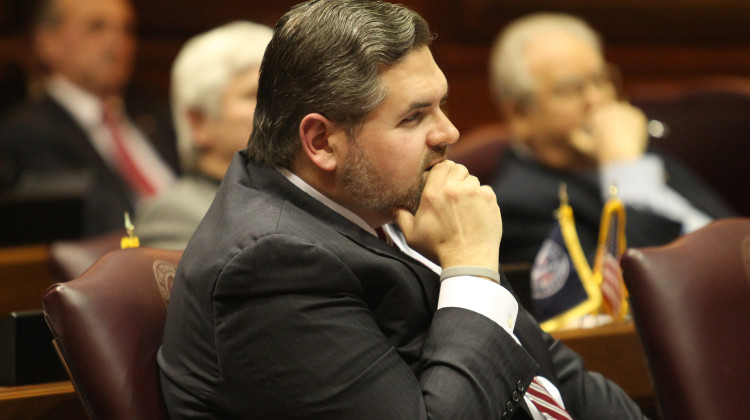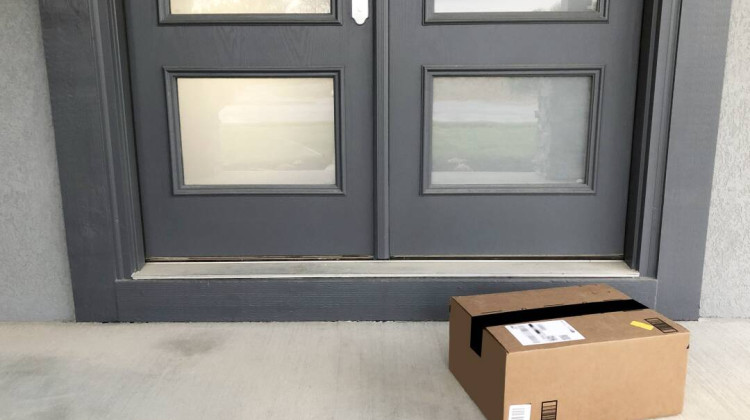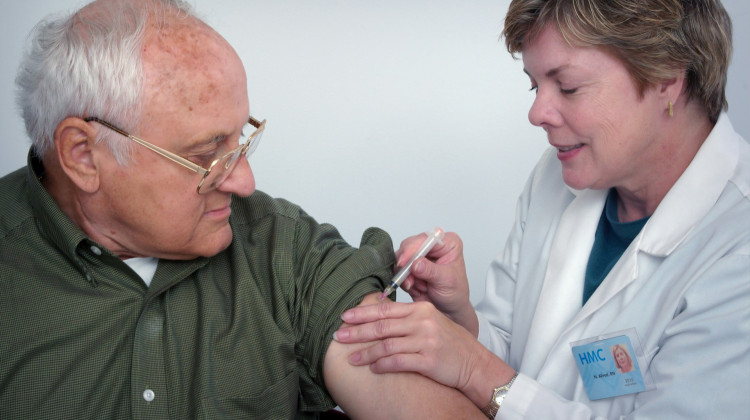
Rep. Ed Clere (R-New Albany) said it’s time to revisit the original policy argument for including the monthly payments.
Lauren Chapman / IPB NewsSeveral lawmakers want the Indiana Family and Social Services Administration to remove a policy from the Healthy Indiana Plan, or HIP, that has been linked to loss of coverage for Medicaid members. The calls to reevaluate POWER account contributions come as the state continues to appeal a federal ruling against the policy.
POWER account contributions act as premiums for HIP and are monthly payments required to access the version of HIP with better coverage, HIP plus. In June, a federal ruling determined several HIP policies, including those payments, go against the objectives of the Medicaid Act and limit coverage.
Several lawmakers urged FSSA to eliminate the policy from the program entirely during a Medicaid Advisory Committee meeting Wednesday.
Rep. Ed Clere (R-New Albany) said it’s time to revisit the original policy argument for including the monthly payments, which was to promote personal responsibility in health care coverage for the Medicaid expansion population.
“Our definition of personal responsibility has been focused too narrowly on financial contributions, and it fails to recognize many of the realities of the covered population,” Clere said.
Clere said the General Assembly has the ability to provide members with better tools to promote self-sufficiency and economic empowerment.
“Many, if not most, members of the covered population already demonstrate personal responsibility in very meaningful ways,” Clere said.
Clere also pointed to the fact that there is no data suggesting that POWER account contributions lead to “improved outcomes.” In the federal ruling that is preventing Indiana from bringing the monthly payments back, the judge noted there was more data showing it led to people losing coverage, which negatively affects health outcomes.
The federal government has also raised issues with premiums in the past. In a 2023 letter to Indiana, the U.S. Department of Health and Human Services noted the “large body of evidence” that premiums “reduce access to coverage and care.” HHS ultimately declined to take any action against Indiana. However, a month prior to that letter, HHS said Wisconsin could not have premiums because of the negative impact they have using data collected from Indiana to show why premiums led to a loss of coverage.
READ MORE: Advocates offer advice for Medicaid members navigating federal ruling's effect on HIP
In addition to concerns about coverage, several lawmakers noted there’s also a fiscal reason to eliminate POWER account contributions.
Sen. Fady Qaddoura (D-Indianapolis) said Indiana has not collected POWER account contributions for four years. The state stopped requiring the payment in 2020 as a part of the COVID-19 public health emergency continuous coverage period. This meant all HIP members had access to HIP Plus without the administrative hassle of the POWER account contribution.
Qaddoura said if the state was able to survive without the payments for years, then he urges Indiana to eliminate them entirely rather than fighting to keep them.
“The state would save much more by enhancing access to health care rather than imposing the POWER account fees,” Qaddoura said.
Sen. Shelli Yoder (D-Bloomington) agreed and pointed out HIP doesn’t cost the state that much. She said a large majority of the funding needed for HIP is covered by the federal government.
Federal funding for Medicaid expansion programs covers 90 percent of the cost of the program, which 10 percent is covered by non-federal funding.
However, Yoder said Indiana does take on the costs of administering the program, and POWER account contributions increase the administrative burden.
“It does cost us in administrative costs to try to uphold a program that actually just creates barriers to people who are eligible for health care,” Yoder said.
READ MORE: HIP Plus members will keep coverage as Indiana's appeal moves forward
Join the conversation and sign up for the Indiana Two-Way. Text "Indiana" to 765-275-1120. Your comments and questions in response to our weekly text help us find the answers you need on Medicaid and other statewide issues.
Yoder said the program actually saves the state money by covering so many people without using state funding.
“Since it seems that most of our conversations are on how we can save money when it comes to Medicaid dollars, here is one way that we can actually save money and do right by Hoosiers,” Yoder said.
Rep. Chris Campbell (D-West Lafayette) said the HIP program is a good investment of federal funds.
“It saves us money in the long run to not pile on this additional medical expense on the families that just cannot afford it,” Campbell said.
However, Campbell said POWER account contributions act as a barrier for members and eliminating them would benefit the state’s Medicaid population.
“Everybody is one illness away from complete devastation,” Campbell said. “This is an opportunity for the state to invest in its population.”
The federal ruling in June struck down the approval for the entire HIP program. The judge granted a limited stay Tuesday, based on an agreement between the plaintiffs, Indiana and the Centers for Medicare and Medicaid Services.
Indiana has agreed not to collect POWER account contributions as its appeal moves forward. This means HIP members enrolled in HIP Plus will maintain that coverage and new members will also be enrolled in HIP Plus without needing to make the monthly payments to maintain it.
Cora Steinmetz, Indiana’s state Medicaid director, said the state is still working to appeal the ruling. One lawmaker asked what the plan was if the state lost the appeal.
“We certainly will have to cross that bridge if and when that happens, and are definitely preparing for eventualities, but doing our best to maintain the status quo for the program,” Steinmetz said.
Other Medicaid programs are not affected by the ruling. Cost-sharing, including copayments and premiums, for the Children’s Health Insurance Program, or CHIP, and MEDWorks resumed as planned in July.
Abigail is our health reporter. Contact them at aruhman@wboi.org.
 DONATE
DONATE







 Support WFYI. We can't do it without you.
Support WFYI. We can't do it without you.